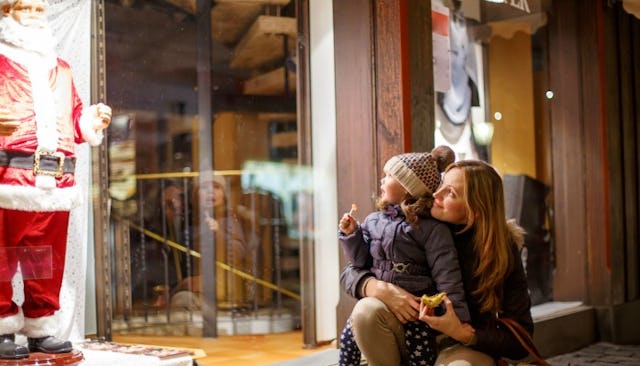A Gentle Plea From Parents Who Don't Do Santa

Our family has never done Santa Claus. It’s nothing against the jolly old fellow—it’s just not for our family. We enjoy movies about Santa Claus (those Tim Allen movies are hilarious), and we explain to our kids the evolution of St. Nick and all of that. We just don’t actually “do” the traditional Santa thing: no cookies and milk, no naughty or nice lists, no gifts from the big guy.
I don’t begrudge the millions of parents who do do Santa (*snort* “do do Santa”). All families have their traditions, and Santa is a big one in Western culture. I’ve got no problem with that.
I do, however, take slight issue with people asking my kids what Santa brought them for Christmas.
It’s usually strangers at the grocery store or front desk people at businesses who ask. I know people are trying to be nice and make conversation, and that’s great. It’s the assumptions behind the questions that kind of bug me. First, it’s assuming that we celebrate Christmas, and second, that we do Santa. Is it because I’m an average-looking white lady in America? Doesn’t that seem kind of presumptuous?
I imagine a lot of people just don’t think about it. Most people in America do celebrate Christmas and a good portion of parents do do Santa (ha! There it is again). But I would never assume that a stranger I come across in a store automatically falls into that category.
However, the main reason I cringe at the Santa questions is because it puts our kids—especially when they’re very young—in an awkward position. It’s not as benign a question as it seems. It’s a question that’s wrapped with all the warmth of the season, ribboned with nostalgic childhood memories, and topped off with a joyful smile. My kids know that when they answer truthfully—that we don’t do Santa—there will be an awkward pause and the questioner’s smile will fade, if only slightly. Their answer will be a disappointment, like they’ve ruined a perfectly lovely interaction by telling the truth.
My kids are pretty shy, so talking to strangers is always a little tricky for them anyway. But there’s no way for them to answer the “What did you ask Santa to bring you for Christmas?” question without disappointing the questioner. I’ve seen it happen time and again. The questioner is taken aback by the response, there’s a weird and awkward moment, and the kids inevitably feel like it’s their fault. It’s a big struggle for them to figure out how to answer the nice lady at the store without feeling like they’re making her uncomfortable with their answer. They’ll learn that skill eventually, but it’s a lot to expect from a kid of 5 or 6. So they look up at me, like, “Um, Mom, what do I do here?” I’ve learned to step in to answer for them, keeping the tone light and friendly: ”Oh, we don’t actually do Santa,” and then subtly changing the subject, but I don’t like answering for my kids. It just creates a weird situation all around.
All of this could be avoided, of course, if people didn’t make assumptions about people they don’t know. I’m not suggesting avoiding conversation starters, even regarding the holidays. There are all kinds of questions that can be asked that don’t have any underlying assumptions about beliefs or practices. “Do you have any big plans for the holiday break?” is a reasonable one. Heck, you can even call it Christmas break if that’s important to you. That phrasing still doesn’t assume anything about the other person. “What did you ask Santa to bring you for Christmas?” does.
This is just a humble request. I know people get touchy about Merry Christmas vs. Happy Holidays, and some folks get fiercely protective of the Santa Claus tradition. Please just keep in mind that a lot of families—even ones who fully celebrate Christmas in every other way—don’t do Santa. And despite your good intentions, by assuming they do, you might create an unnecessarily awkward situation for you and the poor kid you’re asking.
This article was originally published on